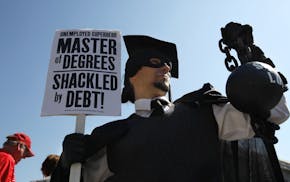Last month the city of St. Paul agreed to contribute almost $2 million toward the expansion of Cossetta's, a popular Italian restaurant near the Xcel Energy Center, that will eventually result in the equivalent of 100 new full-time jobs by 2015.
At the restaurant owner's insistence, though, the city waived a requirement that he pay current and future employees, full- and part-time, a "living wage" of at least $11.82 an hour.
Two weeks after the vote, Kristine Jacobs had not moved on, at least emotionally.
"Why should the people who work at Cossetta's be deprived of the right to earn enough money to support their family?" Jacobs asked. "Why would the city agree to do something like this?"
The short answer -- the promise of jobs, any jobs, at a time when the number of people looking for them far outstrips the number available -- is not good enough.
For Jacobs and the small St. Paul-based nonprofit she has led since 1992, Jobs Now Coalition, the number of new jobs is less important than the quality of those jobs.
Jacobs and Jobs Now have been outspoken and remarkably effective advocates for the notion that Minnesota should insist that employers provide jobs that pay livable wages to their workers.
More than a decade ago, Jacobs warned about worrisome possibilities such as wage stagnation and the loss of high-paying jobs. But even as those trends have materialized, Jacobs finds herself fighting for Jobs Now's very survival.
Donations and other revenue plunged to about $165,000 last year, from almost $641,000 in 2007. Cash reserves built up in good times have mostly evaporated, and the three-person operation will soon move into smaller office space on Selby Avenue.
Most job creation programs or initiatives focus on the needs of employers, but Jobs Now has always put workers front and center. The initial impetus to examine the quality of jobs came from its coalition members, which included a variety of social service organizations.
"Unemployment was low at the time, but demand for their services was soaring," Jacobs said. "They wanted to know what was going on."
The first Minnesota Job Gap Study, in 1995, reframed the conversation around job creation to include what it considered as a moral imperative. Minnesota's economy was creating jobs at a faster rate than the nation as a whole, but Jobs Now researchers found that fewer than half of all Minnesota jobs paid a livable wage, which it then defined as $10.23 an hour for a single parent with two children.
"The labor market wasn't producing the kind of jobs that people needed," Jacobs said.
To some degree, Jobs Now has been a victim of its own success, the most notable being ordinances in Minneapolis and St. Paul that require businesses receiving public subsidies to pay living wages to their employees. If you want a public subsidy, you must meet a public purpose.
"I think they've made a tremendous contribution to both job growth and economic justice in Minnesota," said Dane Smith, executive director of Growth & Justice, a nonprofit advocacy group founded by former Star Tribune Publisher Joel Kramer.
As the economy worsened, however, a philosophical divide opened between Jobs Now and some of its biggest funders, who shifted their focus to education and other programs that better prepare tomorrow's workforce. The thinking: A highly educated populace would eventually attract a greater number of employers offering highly paid jobs.
Kevin Ristau, Jobs Now's director of education and research (he's also Jacobs' partner of almost 25 years), acknowledges the value of education in preparing people for good-paying jobs. The problem, as he sees it, is that the economy isn't creating enough of those jobs.
Of the 10 occupations the Bureau of Labor Statistics expects to add the most jobs by 2018, only two require a college or postsecondary degree. Meanwhile, in Minnesota the median wage for some of those jobs, such as health care support workers and retail salespeople, actually fell between 2001 and 2009 when adjusted for inflation.
Jobs Now's influence could be seen in a bill Sen. John Marty, DFL-Roseville, introduced last week that would raise Minnesota's minimum wage from $6.15 to $10.50 an hour in 2012. That's what it would be if it had kept up with inflation since the 1960s.
"Imagine what all wages would be if the minimum were over $10 an hour," Jacobs said. Which is probably why Marty's bill amounts to tilting at windmills.
Meanwhile, Jacobs is trying to drum up more donations. When we spoke on Wednesday, she was on her way to speak to a women's labor group near Brainerd.
Jacobs gave up her $78,000 salary a few months ago. Ristau, meanwhile, just had his restored after going without for almost 15 months.
In other words, an organization that champions livable wages for others hasn't been able to provide the same for its two principals.
"Yes, that irony has been pointed out to us," Ristau said.
ericw@startribune.com • 612-673-1736

Wieffering: Time to get over debit card fees
For Thrivent and others, warnings were there

With billions in sales, some co-ops are big business

